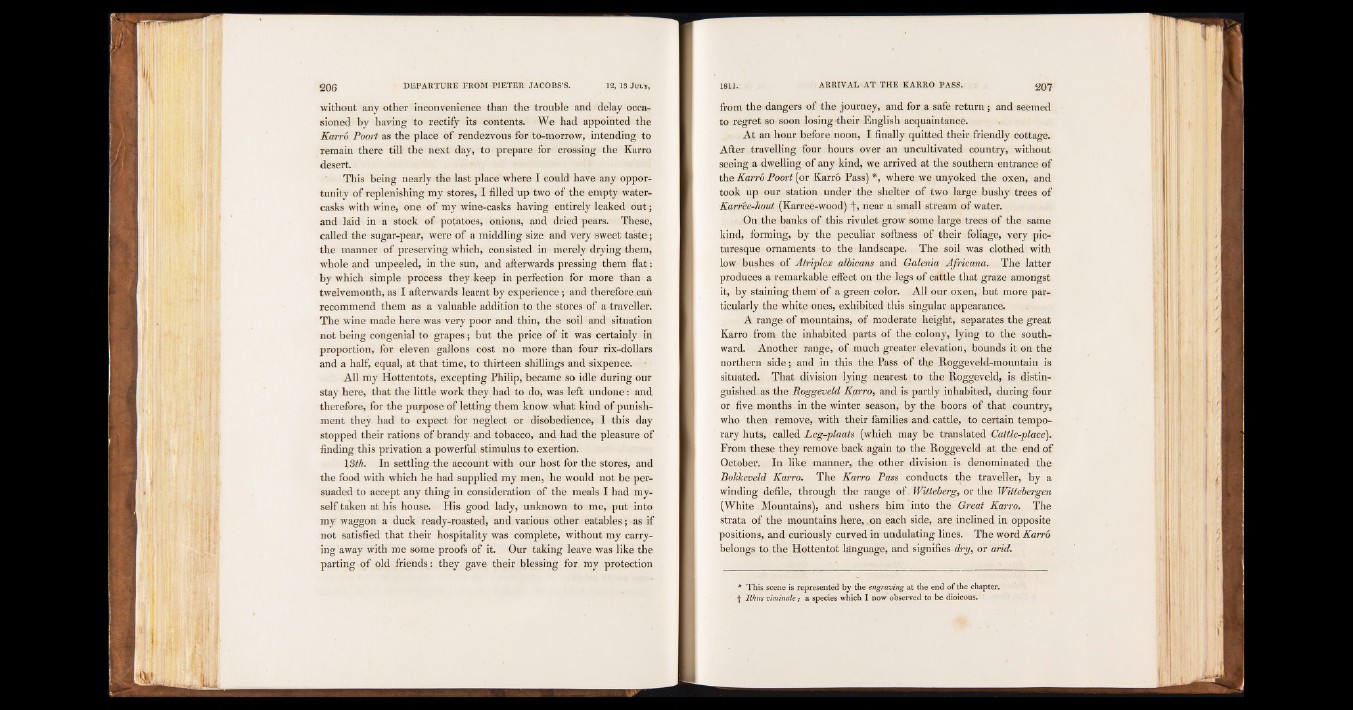
without- any other inconvenience than the trouble and delay occasioned
by having to rectify its contents. We had appointed the
Karri5 Poort as the place of rendezvous for to-morrow, intending to
remain there till the next day, to prepare for crossing the Karra
desert.
This being nearly the last place where I could have any opportunity
of replenishing my stores, I filled up two of the empty water-
casks with wine, one of my wine-casks having entirely leaked ou t;
and laid in a stock of potatoes, onions, and dried pears. These,
called the sugar-pear, were of a middling size and very sweet taste;
the manner of preserving which, consisted in merely drying them,
whole and unpeeled, in the sun, and afterwards pressing them flat:
by which simple process they keep in perfection for more than a
twelvemonth, as I afterwards learnt by experience; and therefore.caii
recommend them as a valuable addition to the stores of a traveller.
The wine made here was very poor and thin, the soil and situation
not being congenial to grapes; but the price of it was certainly in
proportion, for eleven gallons cost no more than four rix-dollars
and a half, equal, at that time, to thirteen shillings and sixpence.
All my Hottentots, excepting Philip, became so idle during our
stay here, that the little work they had to do, was left undone: and
therefore, for the purpose of letting them know what kind of punishment
they had to expect for neglect or disobedience, I this day
stopped their rations of brandy and tobacco, and had the pleasure of
finding this privation a powerful stimulus to exertion.
13th. In settling the account with our host for the stores, and
the food with which he had supplied my men, he would not be persuaded
to accept any thing in consideration of the meals I had myself
taken at his house. His good lady, unknown to me, put into
my waggon a duck ready-roasted, and various other eatables; as if
not satisfied that their hospitality was complete, without my carrying
away with me some proofs of it. Our taking leave was like the
parting of old friends: they gave their blessing for my protection
from the dangers of the journey, and for a safe return ; and seemed
to regret so soon losing their English acquaintance.
At an hour before noon, I finally quitted their friendly cottage.
After travelling four hours over an uncultivated country, without
seeing a dwelling of any kind, we arrived at the southern entrance of
the Karro Poort (or Karro Pass)*, where we unyoked the oxen, and
took up our station under the shelter of two large bushy trees of
Karree-hout (Karree-wood) j*, near a small stream of water.
On the banks of this rivulet grow some large trees of the same
kind, forming, by the peculiar softness of their foliage, very picturesque
ornaments to the landscape. The soil was clothed with
low bushes of Atriplex albicans and Galenia Africana. The latter
produces a remarkable effect on the legs of cattle that graze amongst
it, by staining them of a green color. All our oxen, but more particularly
the white ones, exhibited this singular appearance.
A range of mountains, of moderate height, separates the great
Karro from the inhabited parts of the colony, lying to the southward.
Another range, of much greater elevation, bounds it on the
northern side; and in this the Pass of th,e Roggeveld-mountain is
situated. That division lying nearest to the Roggeveld, is distinguished,
as the Roggeveld Karro, and is partly inhabited, during four
or five months in the winter season, by the boors of that country,
who then remove, with their families and cattle, to certain temporary
huts, called Leg-plaats (which may be translated Cattle-place).
From these they remove back again to the Roggeveld at the end of
October. In like manner, the other division is denominated the
Bokkeveld Karro. The Karro Pass conducts the traveller, by a
winding defile, through the range of. Witteberg, or the Wittebergen
(White Mountains), and ushers him into the Great Karro. The
strata of the mountains here, .on each side, are inclined in opposite
positions, and curiously curved in undulating lines. The word Karro
belongs to the Hottentot language, and signifies dry, or arid.
* This scene is represented by the engraving at the end of the chapter,
f Rhus viminale i a species which I now observed to be dioicous.